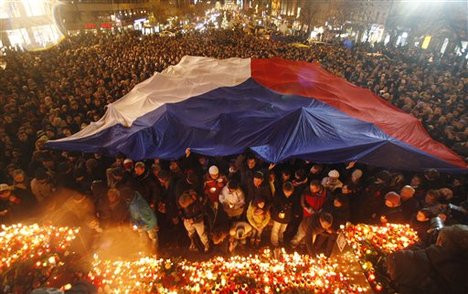 “Mourning; Thousands gathered on Sunday in Wenceslas Square in Prague, some under a Czech national flag, to marke the death of Vaclav Havel.” Source of caption: print version of the NYT obituary quoted and cited below. Source of photo: http://4.bp.blogspot.com/-PGUPpCvWzRQ/Tu9C59lXdJI/AAAAAAAAAEQ/0lcI7EfO8P4/s1600/Vaclav%2BHavel%2B3.jpg [The photo appeared on p. A10 of the print version of the obituary, but was not included with the online version.]
“Mourning; Thousands gathered on Sunday in Wenceslas Square in Prague, some under a Czech national flag, to marke the death of Vaclav Havel.” Source of caption: print version of the NYT obituary quoted and cited below. Source of photo: http://4.bp.blogspot.com/-PGUPpCvWzRQ/Tu9C59lXdJI/AAAAAAAAAEQ/0lcI7EfO8P4/s1600/Vaclav%2BHavel%2B3.jpg [The photo appeared on p. A10 of the print version of the obituary, but was not included with the online version.]
(p. A1) Vaclav Havel, the Czech writer and dissident whose eloquent dissections of Communist rule helped to destroy it in revolutions that brought down the Berlin Wall and swept Mr. Havel himself into power, died on Sunday. He was 75.
. . .
A shy yet resilient, unfailingly polite but dogged man who articulated the power of the powerless, Mr. Havel spent five years in and out of Communist prisons, lived for two decades under close secret-police surveillance and endured the suppression of his plays and essays. He served 14 years as president, wrote 19 plays, inspired a film and a rap song and remained one of his generation’s most seductively nonconformist writers.
All the while, Mr. Havel came to personify the soul of the Czech nation.
His moral authority and his moving use of the Czech language cast him as the dominant figure during Prague street demonstrations in 1989 and as the chief behind-the-scenes negotiator who brought about the end of more than 40 years of Communist rule and the peaceful transfer of power known as the Velvet Revolution, a revolt so smooth that it took just weeks to complete, (p. A10) without a single shot fired.
. . .
He never stopped preaching that the fight for political freedom needed to outlive the end of the cold war. He praised the American invasion of Iraq for deposing a dictator, Saddam Hussein.
He continued to worry about what he called “the old European disease” — “the tendency to make compromises with evil, to close one’s eyes to dictatorship, to practice a politics of appeasement.”
For the full obituary, see:
DAN BILEFSKY and JANE PERLEZ. “VACLAV HAVEL, 1936-2011; Czechs’ Dissident Conscience, Turned President.” The New York Times (Mon., December 19, 2011): A1 & A10.
(Note: ellipses added.)
(Note: the online version of the obituary is dated December 18, 2011, and had the title “VACLAV HAVEL, 1936-2011; Vaclav Havel, Former Czech President, Dies at 75.”)

